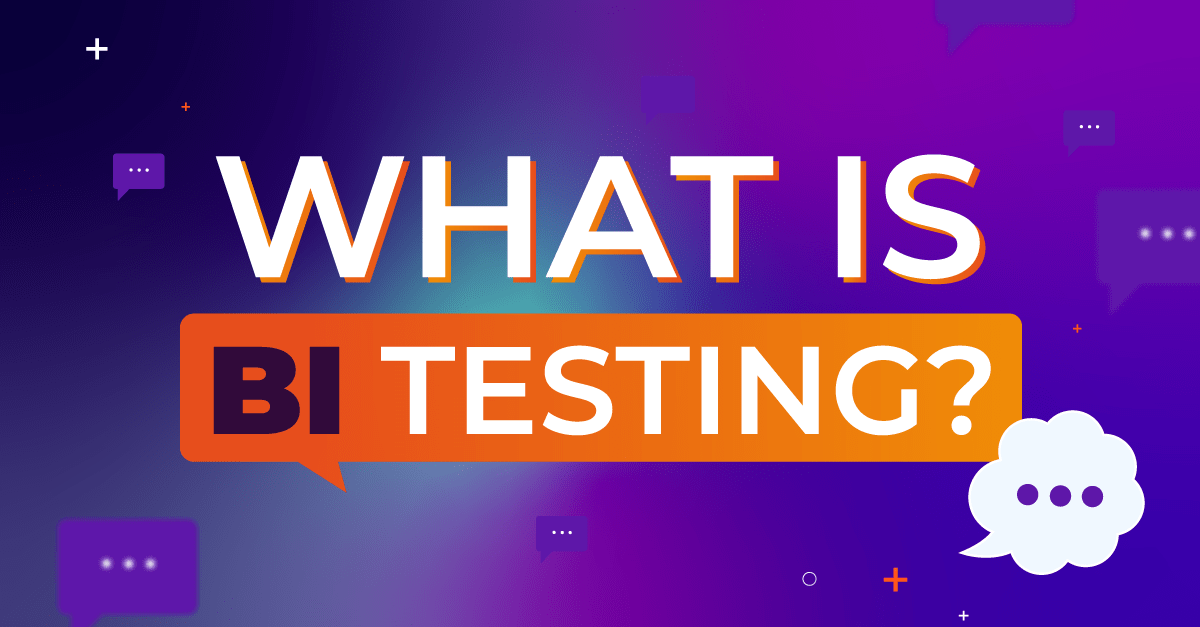Lire cet article en Français ![]()
What is BI Testing?

BI Testing 101
What is BI (business intelligence) testing exactly? It’s the process of verifying and validating the accuracy and reliability of insights delivered by BI & Analytics platforms. BI testing usually refers to testing on traditional reporting systems such as SAP BusinessObjects, Microstrategy, or IBM Cognos, whereas when it comes to testing on more modern Data Analytics platforms like Tableau, Microsoft Power BI, or Qliksense, we tend to refer to that as Data Analytics testing.
Today, decision-makers use these insights to make critical business decisions. BI testing ensures the data upon which they make these decisions are trusted, governed, and accurate. Organizations can no longer see business intelligence testing as an option but a must-have.
The Challenges of BI Testing
Despite the critical importance of BI testing, there are some potential challenges organizations face when putting it into practice:
1. BI system complexity
BI systems process large volumes of data from multiple sources and testing this data can be challenging. The data may have inconsistencies, errors, or duplicates that could impact the accuracy of the insights generated by the BI system.
2. BI testing tool choice
There are lots of different BI testing tools available for automated BI testing, and it all depends on what type of testing you want to carry out. For example, is it to ensure data governance or do you want to go one step further and test the data once it goes into the BI & Analytics software?
Psst…Wiiisdom focuses its energy on Analytics quality with governance solutions that put your dashboards under continuous verification.
3. BI/QA Literacy
Large organizations leverage between 5 and 9 BI systems at a time and with the current talent shortage, it makes it a real challenge for organizations to have a complete understanding of how those BI systems work and what to test and when.
4. Sole reliance on data testing
People need to understand that just because the data in the data warehouse is accurate doesn’t mean that it will remain accurate once the BI user creates a dashboard with their own formulas. Between the data warehouse and the dashboard, there are lots of occasions for the data to be transformed.
5. Absence of Responsibility
Who should be in charge? Let’s be honest, nobody likes testing. A developer could potentially test their own dashboard before delivering it to the final Line of Business or customer, but there needs to be someone in charge of continuously testing it. Organizations need to create a BI QA team to take responsibility for this. At the end of the day, ensuring data quality will always fall to the CDO or CDAO.
6. BI testing strategy
You cannot simply start testing without a proper strategy in place. You need to decide what you are going to test, who is going to supervise the tests, the quality indicators, the frequency of the tests, etc. This can take time but once put in place, you’ll have a process that you can continually follow. We published a BI testing checklist to help you with your testing strategy.
7. Manual BI testing
The problem with business intelligence testing is that there are still organizations carrying out manual testing which is error-prone, unscalable, and time-consuming because people never have time to test absolutely everything. Too much is at risk to continue doing manual business intelligence testing and organizations need to invest in proper automated solutions. Regulated organizations also cannot allow any external access to their business data so any testing must be done in-house.
The Advantages Of BI Testing
What is an advantage of BI testing? Here you’ll find the top four advantages:
1. Better data & analytics quality
During the data journey, there are so many occasions for the data to be transformed thus impacting the quality whether it’s at the data level or the Analytics level. Business intelligence testing will ensure the data is of the highest quality no matter where it is along the journey, and therefore allow business leaders to make more informed decisions.
2. Reduced risks
Important decisions are at stake and automated testing will reduce the risk of poor decision-making and thus any disastrous consequences because of it. Decisions need to be made on trusted data, rather than on gut or data that hasn’t been tested.
3. Greater efficiency
Business intelligence testing helps to identify and fix any errors so less time is wasted trying to generate reports and dashboards on data that isn’t accurate.
4. Fuels a data culture
Business intelligence testing will reduce errors in your BI & Analytics platform, thus creating more trust and better user adoption. All these combined make for a better decision-making process.
Ready to discover more?
Business intelligence testing too often means many things to many people. When it is properly implemented and tested, it can help organizations get closer to their business objectives. Here you’ve discovered what it means, and the challenges and advantages of putting it in place. If you would like to go one step further, we’ve put together the most important types of BI testing for BI & Analytics platforms.




